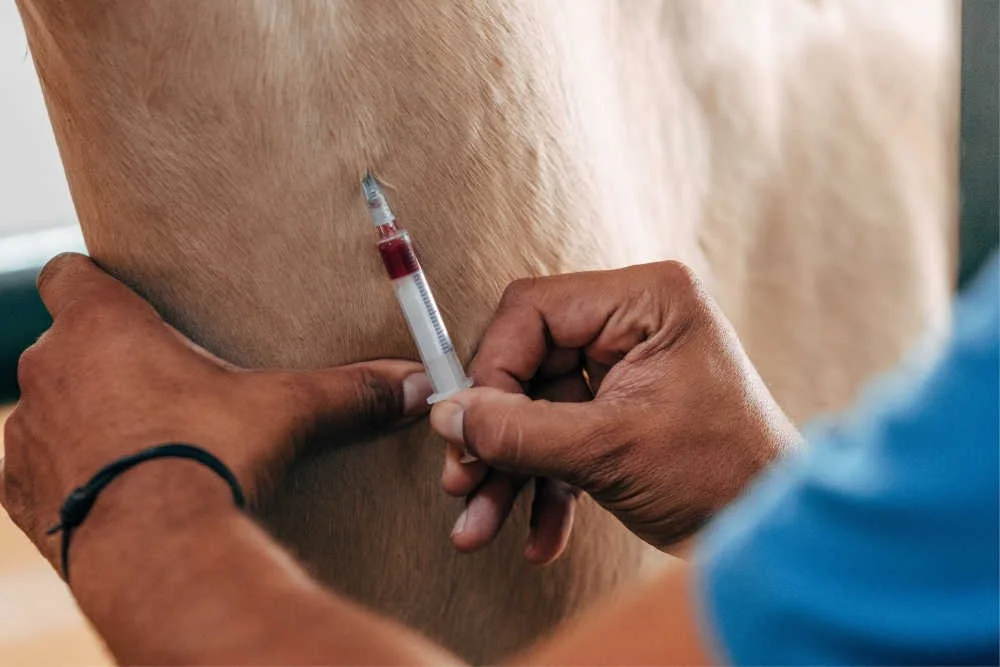Do You Know How to Obtain Ideal Blood Work for Your Insulin Resistant Horse?
If you think your horse might be insulin resistant or otherwise metabolically compromised, you’ve probably done some research. And you may feel overwhelmed by the volume of information (and opinions) available on this topic. Do you even know how to start this conversation with your veterinarian?
What blood tests are needed? Does blood need to be drawn at specific times of day? Should my horse fast (be off food for a period of time) before blood is pulled? Is ‘glucose challenging’ still a thing?
These are common questions we hear from G’s Organic Solutions’ customers, so in this blog, we hope to provide you with answers that enable you to be proactive in accurately diagnosing IR and helping your IR horse live comfortably. Regardless of what you’ve read or heard, diagnosing, monitoring, and maintaining your IR horse requires accurate blood work.
You’re in it for the long haul, but you don’t have to go it alone. Your veterinarian and G’s Organic Solutions are your allies!
Which Blood Tests are Needed?
While we would never attempt to second guess your veterinarian, it may be painfully unnecessary on your wallet to immediately order a full hematology profile or full chemistry panel.
To accurately diagnose IR, you’ll want to have your veterinarian specifically test BOTH insulin and glucose.
When Should Blood Be Drawn?
Previously, fasting (12 hours no food) blood work was used to diagnose or rule out IR. But, many cases are missed using this protocol.
New research supports testing 3-4 hours after a meal. Non-IR horses will have little difference between fasting and after a meal. IR horses will have a dramatic spike for 1-4 hours after a meal, even if they are being fed appropriate low sugar & starch feed. This is a safe and conclusive testing protocol.
Consistent Blood Testing is Key
If having your horse tested; consistency is the key. Even if an IR diagnosis is quickly obtained, monitoring and maintaining your IR horse requires ONGOING, accurate, and CONSISTENT blood work.
Book your vet/blood draw appointment and feed accordingly. For example, if your appointment is for nine AM, feed between six and seven AM. Ensure that you follow this same timing every time you test. If something comes up and your vet will be delayed, reschedule. Your vet should understand the importance of consistently testing within that window of time after your horse’s meal.
A couple hours variance won’t help you and your veterinarian determine if the diet or supplement changes you have made are working. In fact, that variation in the results could cause a misdiagnosis. We encourage a variance of no more than 15 minutes from test to test.
Should My Horse be “Glucose Challenged”?
Glucose challenge refers to a testing protocol where blood is drawn before, and then after a high dose of glucose, and the results are compared. This testing approach is no longer recommended, as it can push an IR horse into a laminitic episode.
Although people still use this method, it can put horses through an unnecessary amount of pain when there is a safer and more effective way to test.
What Else Should I Test?
If your horse is diagnosed with IR, it is very important that you have your hay tested for carbohydrates (Water-soluble/WSC & Ethanol Soluble/ESC) and starch. We recommend wet chemistry (not NIR) testing at Equi Analytical in New York. For more information on hay testing, read our new article explaining how to read and analyze your hay tests.
Feed G’s WIRX
Consistent and correct blood testing will help you and your vet understand if your horse’s diet, supplements, and/or medications are working as needed.
Adding G’s WIRX to your horse’s diet has been proven to dramatically and quickly reduce insulin & glucose levels for horses that are already being fed low sugar, low starch meals.
With the appropriate diet (including G’s WIRX), healthy exercise, and consistent blood monitoring, your IR horse can live a long and happy life!
Are you ready to try WIRX?
Learn more about G’s WIRX and shop for yours today!

